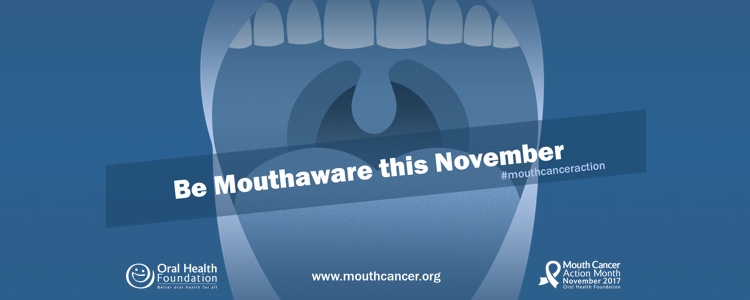What is Mouth Cancer Action Month?

You may have noticed recently, a trend of people sharing blue-lipped selfies on social media, accompanied by the hashtag #BlueLipSelfie. What exactly is this all about and why are more and more dentists, patients and celebrities getting involved?
It is all part of a campaign to boost the profile of Mouth Cancer Action Month. This is an annual charity campaign run by the Oral Health Foundation to promote awareness of mouth cancer and help to make a difference by saving thousands of lives through early detection and prevention.
Here at Bridge Dental & Implant Clinic, we are proud to support the cause and have prepared this informative Q&A to help you learn more about this hugely important subject.
What is Mouth Cancer Action Month & when did it start?
Mouth Cancer Action Month is an annual campaign that runs from 1st to 30th November.
The idea was first conceived in 1998. It followed a number of roundtable meetings involving some of the UK’s leading dental and health professionals, headed up by the late Richard Horner. In 2003, it was later taken on by the Oral Health Foundation – one of the World’s leading independent oral health charities – who introduced the name of ‘Mouth Cancer Action Month’ and successfully transformed it into the high profile campaign it is today.
It was at this time that the Blue Ribbon Appeal was launched, with the aim of acting as a conversation starter between patients and their health professionals. Today there are more than half a million Blue Ribbon Badges in circulation.
This year, to increase awareness even further, the hashtag #BlueLipSelfie has been introduced to encourage the message to be spread on social media and generate even more engagement on the key message of the campaign.
What is Mouth cancer?
Mouth cancer, also known as oral cancer, is a form of cancer where a tumour develops in the lining of the mouth. A tumour may be on the surface of the tongue, the insides of the cheeks, the roof of the mouth (palate), or the lips or gums. Tumours can also develop in the glands that produce saliva, the tonsils at the back of the mouth, and the part of the throat connecting your mouth to your windpipe (pharynx). However, these are less common.
How many people suffer from mouth cancer?
In the last year alone, over 7,000 people have been diagnosed with mouth cancer. Over the last decade, the number of people suffering from the disease has increased by over 30% and this is expected to continue into the coming years.
The latest figures also show that over 1,800 people in the UK lose their lives to mouth cancer every year. This is more than the number of deaths due to cervical and testicular cancer combined. It is a number that can certainly be reduced with increased awareness of the diseases and its symptoms and causes.
There have been some key milestones in the fight against mouth cancer in recent years. For example, the direct marketing ban on tobacco that was introduced in May 2003 and the smoking ban which became law in September 2007. However, whilst these have contributed to a momentous fall in the number of smokers in the UK, there is still a lot to be done to fight mouth cancer.
What causes mouth cancer?
Smoking has historically been a leading cause of mouth cancer and remains a significant factor today. There are, however, other lifestyle factors that are also believed to be contributing to the constant increase in its occurrence. Closely following tobacco is alcohol, which is associated with around a third of all cases. A key risk factor is a combination of smoking and drinking to excess, which research shows leads to an increase in risk of up to 30 times.
Another factor in the disease’s continued prevalence is the considerable increase in human papillomavirus (HPV) mouth cancers which a growing number of experts now believe will one day surpass smoking tobacco as the number one cause of the disease. HPV is a common disease amongst the sexually active and is most often transmitted through oral sex. Whilst in the majority of cases, it is perfectly harmless and goes away without intervention, in up to 10% of cases it can lead to abnormal tissue growth and other changes to cells in some parts of the body, which can cause cancer.
Apart from lifestyle choices, diet is also a major consideration in the fight against mouth cancer. Poor diet is considered to be a factor in up to half of all cases. Luckily, a simple change to a diet rich in fruit and vegetables can significantly reduce your risk. In particular, the following food groups have been seen to have significant effects:
- Fruit – 48% lower risk.
- Vegetables – 34% lower risk.
- Vitamin C supplements – 24% lower risk (versus never-users).
- Calcium supplements – 36% lower risk (versus never-users).
- Caffeinated coffee – 39% lower risk in 4 cups/day (versus non-drinkers).
- Green tea – 20% lower risk.
What are the signs and symptoms of mouth cancer?
If it is caught early, the chances of surviving mouth cancer are nine out of ten. Unfortunately, it is often not diagnosed until it has reached stage 4, which is too late. Because of this, it’s extremely important that we all know what to look out for. Three signs and symptoms NOT to ignore are:
- Ulcers which do not heal in three weeks.
- Red and white patches in the mouth.
- Unusual lumps or swellings in the mouth or head and neck area.
If any of these are noticed, it is essential that you tell your dentist or doctor immediately.
How can my dentist help?
As part of your routine checkup, your dentist will carefully check your head and neck, cheeks, lips, roof of your mouth, floor of the mouth and tongue for any early signs of mouth cancer.
Lifestyle and diet aside, ensuring that you visit your dentist regularly for a checkup is one of the best ways that you can ensure any early signs of mouth cancer are detected before it has a chance to develop into the advanced stage.
This early detection is known to dramatically increase the chances of successful treatment and a full recovery.
To find out more about Mouth Cancer Action Month and how you too can get involved, visit the website at www.mouthcancer.org. If you have any questions or concerns, or would like to arrange an appointment with your dentist now here at Bridge Dental & Implant Clinic in Derby don’t hesitate to call us on 01332 916351 and a member of the team will be happy to help.
Posted by Bridge Dental and Implant Clinic on 17th November 2017, under Mouth cancer


